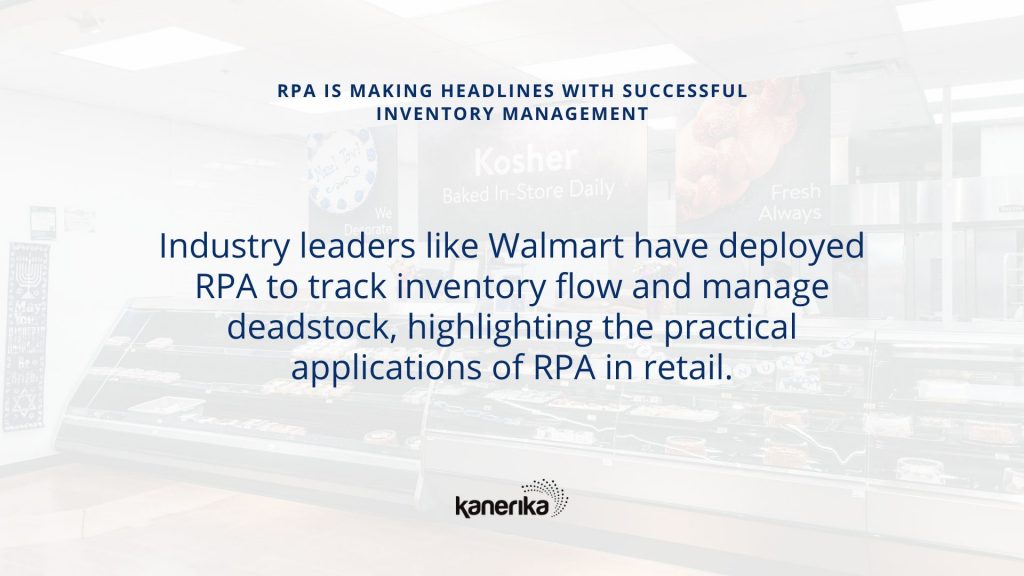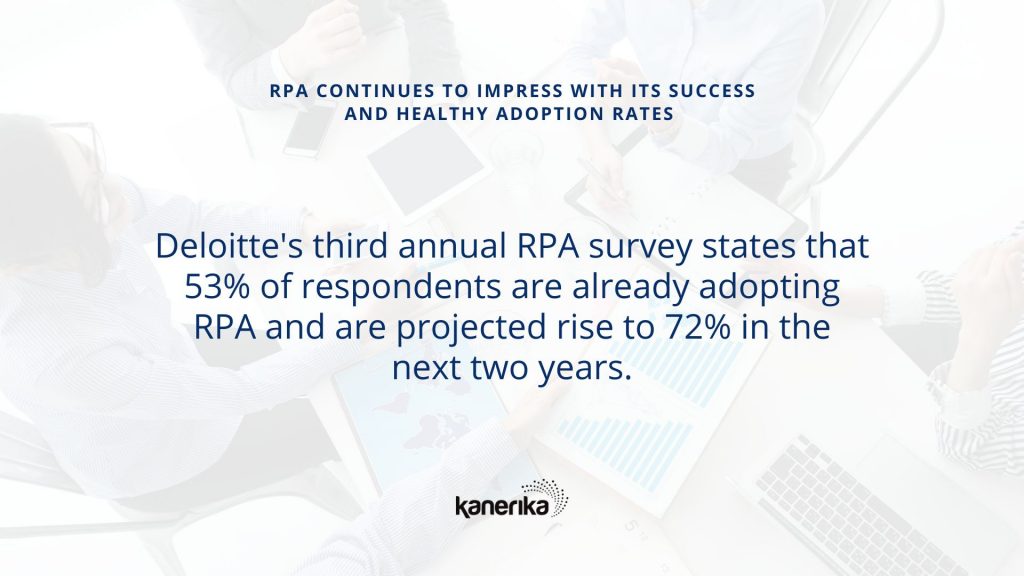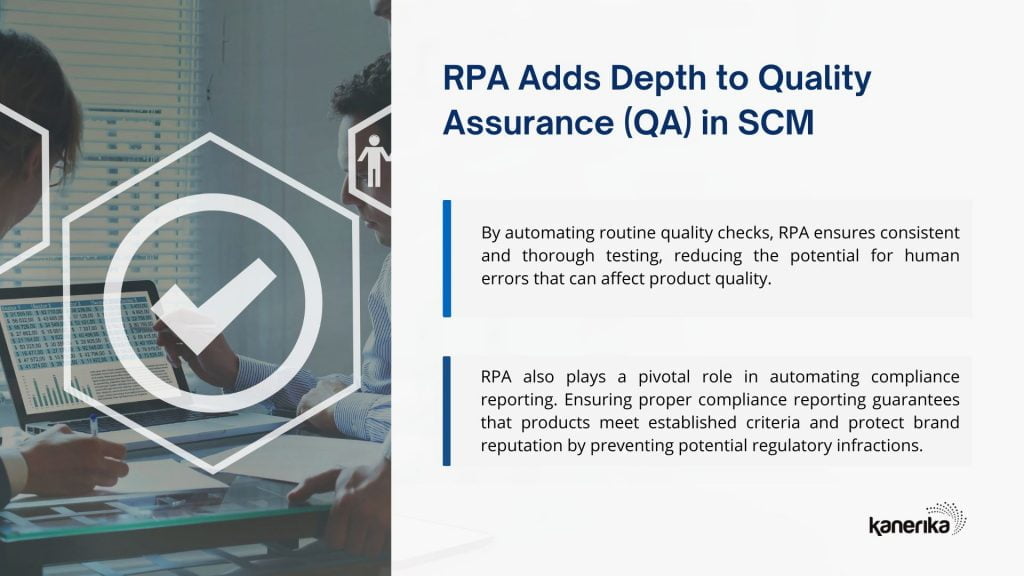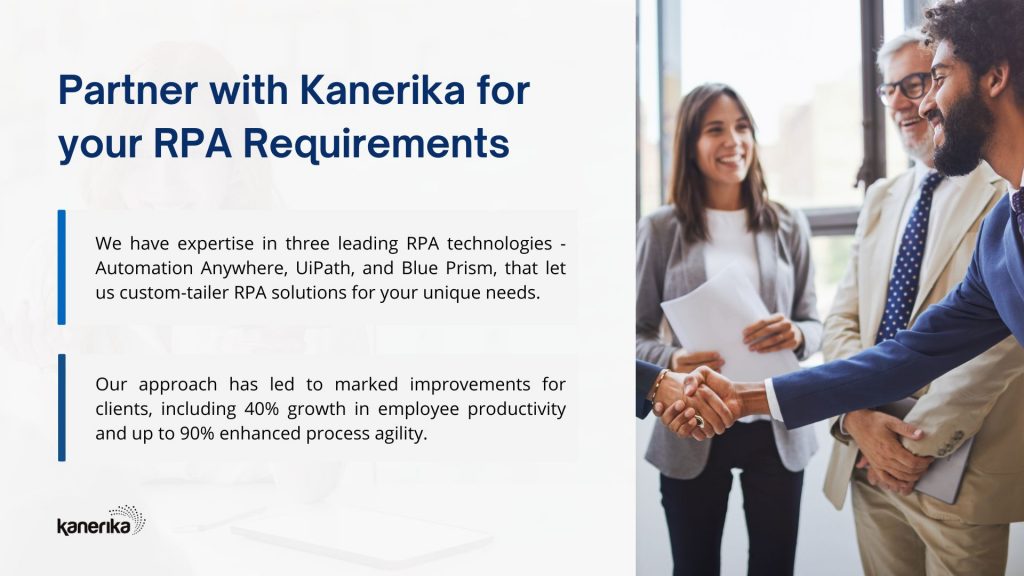Imagine a world where you hop on amazon.com and find all the products are out of stock. You then step outside to your local store in desperate need of groceries, only to find a long queue of people waiting for hours to buy basic necessities. That’s our world without supply chain management (SCM). It is the silent guardian that ensures all global supplies are distributed successfully at all times. RPA plays a pivotal role in the SCM industry running smoothly.
By 2025, over 72% of companies are projected to implement Robotic Process Automation (RPA) in their Supply Chain, as highlighted by a 2019 Information Services Group report.
In this article, we will delve deep into seven impactful RPA use cases that are reshaping the supply chain industry.
Table of Contents
- RPA Use Cases 1: Inventory Management
- RPA Use Cases 2: The Future Of Efficient Order Processing
- RPA Use Cases 3: The Bridge To Better Supplier Relations
- RPA Use Cases 4: Demand Forecasting
- RPA Use Cases 5: Driving Efficiency In Logistics and Distribution
- RPA Use Cases 6: Quality Assurance
- RPA Use Cases 7: RPA’s Modern Approach To Returns Management
- Kanerika – Driving The Future of RPA in Supply Chain Management
RPA Use Cases 1: Inventory Management

Inventory management in the retail sector is a multifaceted task, often challenged by the need to integrate data from diverse sources. By mimicking human actions at the user interface level, RPA ensures accurate and timely inventory records. A survey by UiPath revealed that 67% of global office workers are burdened by repetitive tasks, emphasizing the need for automation.
RPA in inventory management offers real-time inventory data, allowing retailers to monitor product availability and adjust supply proactively. This real-time tracking is crucial in preventing stockouts or excess supply, ensuring optimal stock levels.
For instance, industry leaders like Walmart have deployed RPA to track inventory flow and manage deadstock, highlighting the practical applications of RPA in retail. Furthermore, RPA’s ability to provide automated alerts ensures that staff are promptly notified about potential inventory discrepancies, enabling timely interventions.
RPA Use Cases 2: The Future Of Efficient Order Processing
Order processing is a pivotal component in the supply chain, handling customer requests and determining a supplier’s ability to fulfill them. RPA is revolutionizing this domain by streamlining the order-to-cash process. By automatically extracting sales order data from diverse sources like fax, email, mail, or EDI, RPA eliminates data entry errors, ensuring accuracy in order processing.
Forrester Research indicates that RPA can lead to a staggering 60% cost savings on operational and labor-intensive tasks. Automating significant steps in order processing reduces manual interventions, leading to faster order processing times and reduced overhead costs. This efficiency directly translates to enhanced customer satisfaction.
Furthermore, integrating RPA into order management can address challenges that are often difficult to implement directly into existing ERPs.
Take the example of one of our clients, an organization grappled with automating its Supply Chain workflow across multiple ERPs, including Oracle apps. Every quarter, they spent 50-120 person days validating regression cycles, with errors due to manual work. Additionally, Oracle’s periodic Fusion updates required dedicated validation teams.
Kanerika’s solution, using UiPath, streamlined this process. We developed three bots: one that fed sales order data into the Fusion custom app, another that created a purchase order in Oracle Fusion, and the last that managed order fulfillment in the warehouse system. This automation saved the organization over $100K annually, drastically reduced errors, and reallocated business analysts to more functional tasks.
RPA Use Cases 3: The Bridge To Better Supplier Relations
In the dynamic sphere of supply chain management, maintaining robust supplier relationships is not just beneficial, but vital. It forms the backbone of successful business operations, creating a mutually beneficial environment where both parties can flourish.
This is where the integration of Robotic Process Automation (RPA) into Supplier Relationship Management (SRM) comes into play, streamlining communications and evaluations to facilitate data-driven strategic decisions.
The Supplier Management Software Market is poised for robust growth, with a projected CAGR of 14% from 2021 to 2026. This trend underscores the rising emphasis on automation in Supplier Relationship Management (SRM).
Central to procurement, SRM focuses on nurturing strong ties between companies and their suppliers. With RPA, the collection of supplier performance data is expedited, ensuring accurate and swift evaluations. This automation aids in setting performance metrics, monitoring progress, and ensuring compliance with established standards.
RPA into SRM enhances supplier performance, with automated tools facilitating continuous feedback, fostering collaboration, and ensuring alignment of goals. Moreover, RPA addresses data breaches, offering preemptive solutions to potential supply chain disruptions or financial instabilities. Additionally, automating vendor onboarding processes can lead to market competitiveness, reduced compliance risks, and a fortified vendor selection process, ensuring a holistic and efficient SRM approach.
RPA Use Cases 4: Demand Forecasting

While predictive analytics sets the stage for accurate demand predictions, RPA ensures efficient operational responses to those predictions.
In the supply chain management industry, RPA’s strength lies in its capacity to swiftly and accurately analyze vast datasets. By processing historical sales data, market trends, and other pertinent metrics, RPA tools can generate nuanced and precise demand projections.
Accurate demand forecasts enable businesses to maintain optimal inventory levels, thereby reducing carrying costs, minimizing the risk of stockouts, and curtailing wastage from unsold products. On the production front, accurate forecasts facilitate streamlined production schedules, ensuring efficient resource utilization and curtailing costs associated with overproduction.
Deloitte’s third annual RPA survey further accentuates the transformative potential of RPA. The momentum is undeniable, with 53% of respondents already adopting RPA and a projected rise to 72% in the next two years. The tangible benefits, from improved compliance to boosted productivity, highlight RPA’s potential to reshape industries.
RPA Use Cases 5: Driving Efficiency In Logistics and Distribution
The logistics and distribution sector is undergoing a transformative shift with the integration of RPA. Central to this transformation is the optimization of route planning.
Despite the advancements in route planning technologies, discrepancies in results have persisted. RPA, with its ability to automate intricate planning steps, ensures that all planners, irrespective of their expertise level, can produce optimal routing results.
RPA bots are designed to work tirelessly, enabling extended and more comprehensive planning horizons. This continuous operation translates to reduced overall planning cycles, ensuring timely deliveries and efficient freight management. Furthermore, the automation of these processes means a significant reduction in manual errors, leading to more accurate and reliable route plans.
Forrester Research indicates that RPA can lead to a staggering 60% cost savings on operational and labor-intensive tasks.
RPA Use Cases 6: Quality Assurance

RPA is reshaping the identity of quality assurance (QA) in the supply chain management industry. By automating routine quality checks, RPA ensures consistent and thorough testing, reducing the potential for human errors that can affect product quality.
Beyond just product testing, RPA also plays a pivotal role in automating compliance reporting. Ensuring proper compliance reporting guarantees that products meet established criteria and protect brand reputation by preventing potential regulatory infractions.
A clear example of RPA’s use cases in QA is seen in Kanerika’s success story with Trax. Trax, a leading technology company in spend management solutions, grappled with daily challenges in auditing thousands of invoices.
Additionally, the volatile nature of the invoice rates, influenced by transportation costs and fuel prices, compounded their challenges. They faced issues with the lack of organizational visibility to rates across carriers and the time-consuming process of updating these rates.
Kanerika, leveraging its deep technology expertise, developed a tailored RPA solution for Trax. The “Rate Manager” was an automated auditing product that consolidated multiple rate sheets and agreements into a single online system, ensuring up-to-date rates and accommodating market disruptions. This rule-based engine compared invoices against agreed rates, flagging discrepancies and significantly reducing the manpower required for audits.
The outcome was a streamlined auditing process for Trax, with reduced costs, improved efficiency, and a move towards achieving a 100% “First Pass Yield”.
RPA Use Cases 7: RPA’s Modern Approach To Returns Management
The rise of customer-centric retail processes, especially in e-commerce, has amplified the complexity of returns management. A research study by Forrester Consulting reveals the significant role of RPA in enhancing customer service, with 80% of business leaders believing RPA boosts customer service team efficiency.
Moreover, by automating the returns process, RPA ensures swift and accurate processing of returned items. For instance, when a product is returned, RPA can automatically update stock databases and adjust customer billing, thereby eliminating manual errors and reducing processing time.
For customers, expedited and error-free processing enhances satisfaction. They no longer have to endure extended waiting periods to have their returns acknowledged and to initiate refunds.
From an inventory management perspective, RPA’s real-time updates ensure that returned products are quickly accounted for and available for resale. This reduces holding costs and potential losses from unsold stock.
Kanerika – Driving The Future of RPA in Supply Chain Management

RPA is proving to be a game-changer in supply chain management. Addressing complexities across various domains, from logistics to returns management. As businesses grapple with increasing demands and evolving market dynamics, RPA offers a solution that streamlines operations. As well as enhances customer satisfaction and brand reputation.
Kanerika emphasizes RPA as a foundational step in business transformation, focusing on streamlining operations and reducing costs.
Our approach has led to marked improvements for clients. This includes 40% growth in employee productivity and up to 90% enhanced process agility. Choose Kanerika for a holistic and efficient RPA integration experience.
Book a free RPA consultation with us today!
Follow us on LinkedIn and Twitter for insightful industry news, business updates and all the latest data trends online.